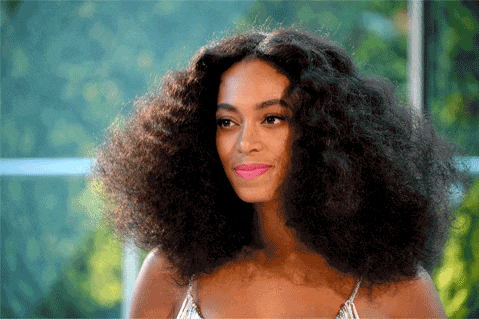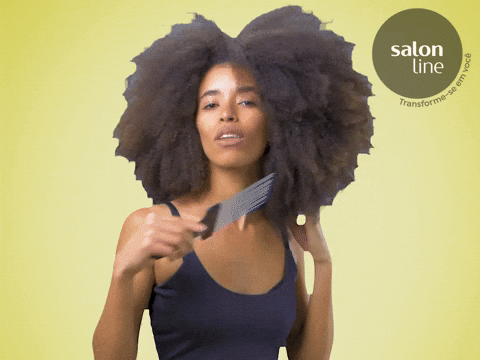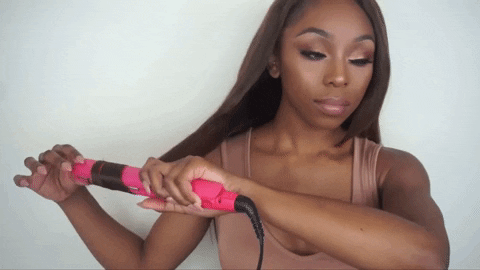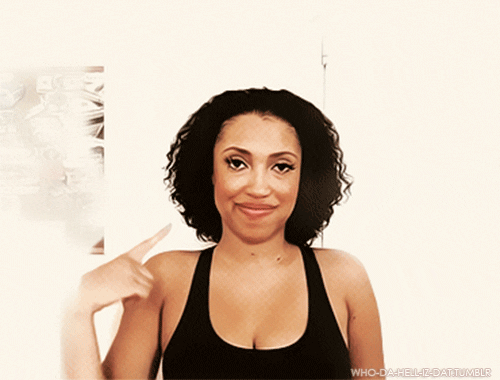
On any given day, a crowd of fans wait eagerly outside of the Slutty Vegan, chatting eagerly about whether they want a Sloppy Toppy or a Ménage à Trois as they wait in hour-long lines. No, this isn't a twisted version of the movie Trois -- unless you count indulging in salacious yet savory food as a form of foreplay.
In fact, just a few months ago many of these patrons wouldn't have thought twice about traveling down to the primarily African-American Southwest Atlanta neighborhood. But today, it's not uncommon to see enthused foodies, celebrities, locals and travelers from all races and backgrounds vying for a chance at tasting the restaurant's famous plant-based burgers. In case the headlines weren't clear, Slutty Vegan is revolutionizing the vegan fast food industry, and it's taking the meaning of food porn to the next level.
INSIDE SLUTTY VEGAN WITH FOUNDER PINKY COLEwww.youtube.com
Leading the way is founder Pinky Cole. With her red, shoulder-length locs, radiating smile, and confidence that permeates any room she enters, Pinky is focused on her vision of making enjoyable vegan food a worldwide phenomenon. "Slutty Vegan [isn't] slowing down anytime soon," says Pinky. "It's going to be alongside the Burger Kings, McDonalds, and Sonics of the world."
Taking a break from her never-ending to-do list, Pinky and I chat about her journey to creating one of the most buzzworthy restaurants in Atlanta and the vegan community, and how she was able to launch and scale her business from concept to a brick-and-mortar restaurant all within a year. It's not long into our conversation that I realize that the key to her success is rooted in two concepts: the power in execution after inspiration and the importance of capitalizing off of momentum. This— and her desire to serve— is what is driving her to turn her idea into a worldwide phenomenon.
"I come as one, but I stand as 10,000. You see me, but I am the representation of so many people that look like me, brown skin and locs— people that don't fit society's norm. I am the representation of successful Black business. There is [a] tax on Black-owned business, that we don't do well. [Slutty Vegan] is changing the game of what Black business looks like. It's a big deal to know that I am able to create something as a Black woman that is successful and bring our stock to the next level."
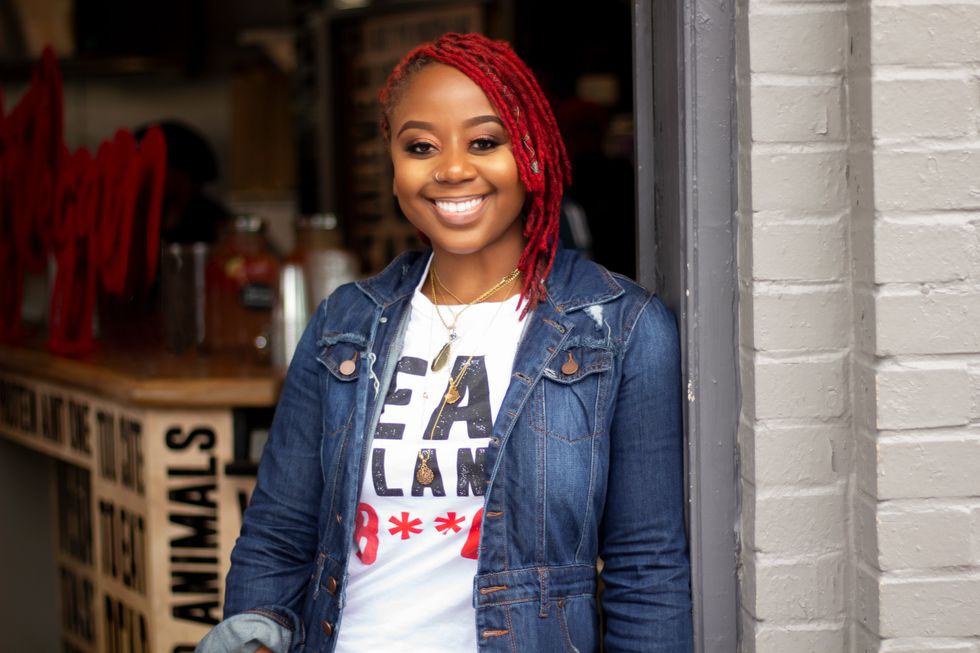
Photo by Tailiah Breon for xoNecole
"I am the representation of successful Black business."
Opening her own restaurant wasn't always the end destination for Pinky. After graduating from Clark Atlanta University she moved to Los Angeles to pursue her dream of acting, but a chain of events led her to her culinary destiny. While in Los Angeles, a sorority sister offered Pinky a position to work as a TV producer. This opened the doors to various roles in the industry, which eventually led her to work with The Maury Show. During this time, Pinky, who loved all things food and business since her youth (and was taught to cook by her Jamaican grandmother), decided to take the money she had saved from her day job to open up her first venture in Harlem: Pinky's Jamaican and American Restaurant.
It was there she experienced her first major setback. "I ended up losing the restaurant due to a grease fire," she says. "It seemed like a failure, but it was the best thing that ever happened."
Soon after, Pinky moved back to Atlanta to work as a casting director for another popular TV show. Being a part of the show's production team allowed her the space to heal from the trauma of losing a business, while also helping to heal and serve others. It wasn't long before she'd have the desire to try her hand at entrepreneurship again. Just a few months into her transition back south, a million-dollar idea was born. "I was sitting in the house one day and I came up with this idea of Slutty Vegan. It came to me like a light bulb. [The name] was sexy. It sounds like it's selling sex, but it's bigger than that. [I knew] it was going to become a movement; it's going to get people to pay attention to being plant-based and veganism."
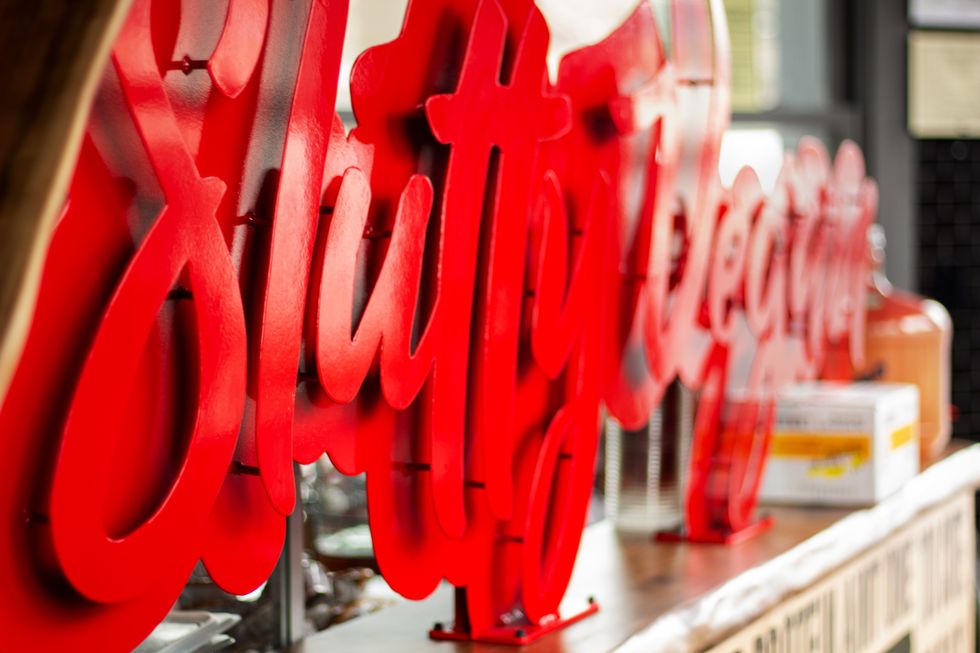
Photo by Tailiah Breon for xoNecole
"It sounds like it's selling sex, but it's bigger than that."
Unlike many who may experience these moments of entrepreneurial epiphanies, Pinky didn't just sit on the idea. She started creating recipes, finding supplier partners, and researching how to expand. In July 2018, she set up shop at a shared kitchen to test out her newly-created cuisine. By August, she moved to a commercial kitchen, invested in a food truck in September, and in October found the location for the first Slutty Vegan restaurant. Three months later, a crowd of 1,200 gathered outside the restaurant in 45-degree weather for the grand opening. "It was so beautiful to see so many people looking like me come out in the name of food," she recalls.
Since its opening in January, the Atlanta-based restaurant has become a mini tourist attraction, with customers lining up as much as two hours in advance of the store's daily opening. Occasionally, the line wraps around the corner with wait times hitting at least five hours or more.
While success seems to be happening fast for the brand, Pinky isn't surprised. She had a feeling this was going to happen, she tells me matter-of-factly. The Slutty Vegan name alone was a hook that would reel her potential customer base in. "There is [a] stigma to the word. [I thought], 'How can I use a bad word to make it something good, be creative and [help people] indulge in what they love guilt-free?'"
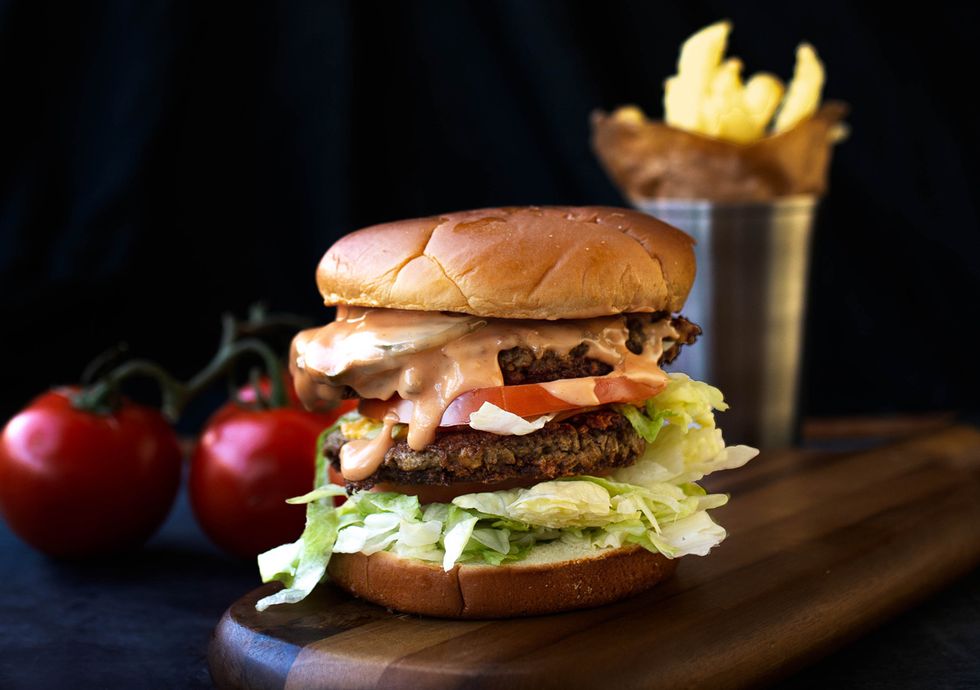
Courtesy of Slutty Vegan
"Veganism can be cool. Being plant-based can be cool. It doesn't have to be mundane."
Such indulgences include the Fussy Hussy— an Impossible Burger patty loaded with pickles, vegan cheese, caramelized onions, lettuce, tomato, and their signature slutty sauce without the cholesterol and calories of a traditional burger. It's the creative genius behind Pinky's idea— and she knows it. "It feels like it's bad because it's a cheeseburger and fries, but it's a lot healthier, which is why the hook to the conversation is you don't have to eat dead animals in order for it to taste good," Pinky says. "We can limit and decrease the amount of illnesses and disease in our community based on the food we ingest. That intention is continuing to be met because it's working."
To no surprise, at the core of the Slutty Vegan branding strategy is experience. Pinky has been deliberate about how she's crafted the way customers interact with the brand since the beginning. "Build your brand in a way that is so irresistible that people have to have it. When people have to have it, they will do whatever to get it. Slutty Vegan has been successful [in] creating an experience for people so that they have to have it by any means necessary," she tells me. "Veganism can be cool. Being plant-based can be cool. It doesn't have to be mundane."
It's why on the Slutty Vegan Instagram you'll hardly see any brand-generated photos of their signature burgers. Pinky also doesn't spend money on influencer marketing, and will tell you in a heartbeat that she's "not selling food." Instead, she's "helping people indulge in what they love."
Even Pinky's celebrity co-signers are genuine, unpaid, and helping to push the brand's message to a larger audience. "When you eat my food as a celebrity, you're jumping on board to this bigger conversation and spreading a narrative of eating healthier and limiting diseases in our community. That's what we call positive manipulation, and it's working."
It's understandable why after tasting her burgers people can't stop eating or talking about Pinky Cole and Slutty Vegan. There's something magical about the way the brand has been able to sprout out of nowhere and dominate the food scene. It leaves little room for doubt as to where Pinky plans on taking her company. "In 2019, you have to do things that are going to separate you from everyone else," she says.
While I'm not sure if Pinky would describe herself as radical, she's definitely a rule-breaker. Going against the norm has enabled her to bring the Slutty Vegan story to the forefront. According to Pinky, moving the food truck location daily is not usually a food truck culture norm, but Slutty Vegan does it anyway. Using provocative nomenclature in brand marketing could also be seen as risky, but despite all of this, Pinky believes that her desire to change the rules of how to start and run a business have helped fuel the company's success. If you're thinking of ways to engage with customers or influence sales, thinking outside the box can lead to breakthroughs that can ultimately fuel growth.
However, no hero's journey is complete without a major test of character and commitment to their dream.
Slutty Vegan was invited to vend at the 2019 Super Bowl, and Pinky found herself having to make the difficult decision as to whether she'd accept the opportunity or not. She was told that she'd have to change the restaurant's name, branding and wrapping. While the optics and sales would have been great, Pinky realized she would have to compromise on everything she worked hard to create. To Pinky, this wasn't worth sacrificing her brand footprint. She adds with conviction, "I am glad I didn't compromise who I am for the dollar. The people who want me are going to come to me."
The people have been coming alright. The decision alone to launch a vegan restaurant in Atlanta could be the perfect example of "right place, right time." However, it's a reminder of a higher alignment. It shows how sometimes things are supposed to happen as they happen. One of the first things Pinky told me during our chat was, "If [my first] restaurant didn't close, we wouldn't be having this conversation."
"I was supposed to be in Atlanta. [Atlanta is] the home of soul food. It's the South. If you tell people in the South about vegan food, they laugh at you. To be able to do this [here], we've conquered something that is really not a big deal. We've done it and we can go somewhere else and they'll be with the movement. [In] Los Angeles, DC, or New York, veganism is normal. The fact that I am able to do this in Atlanta is dope."
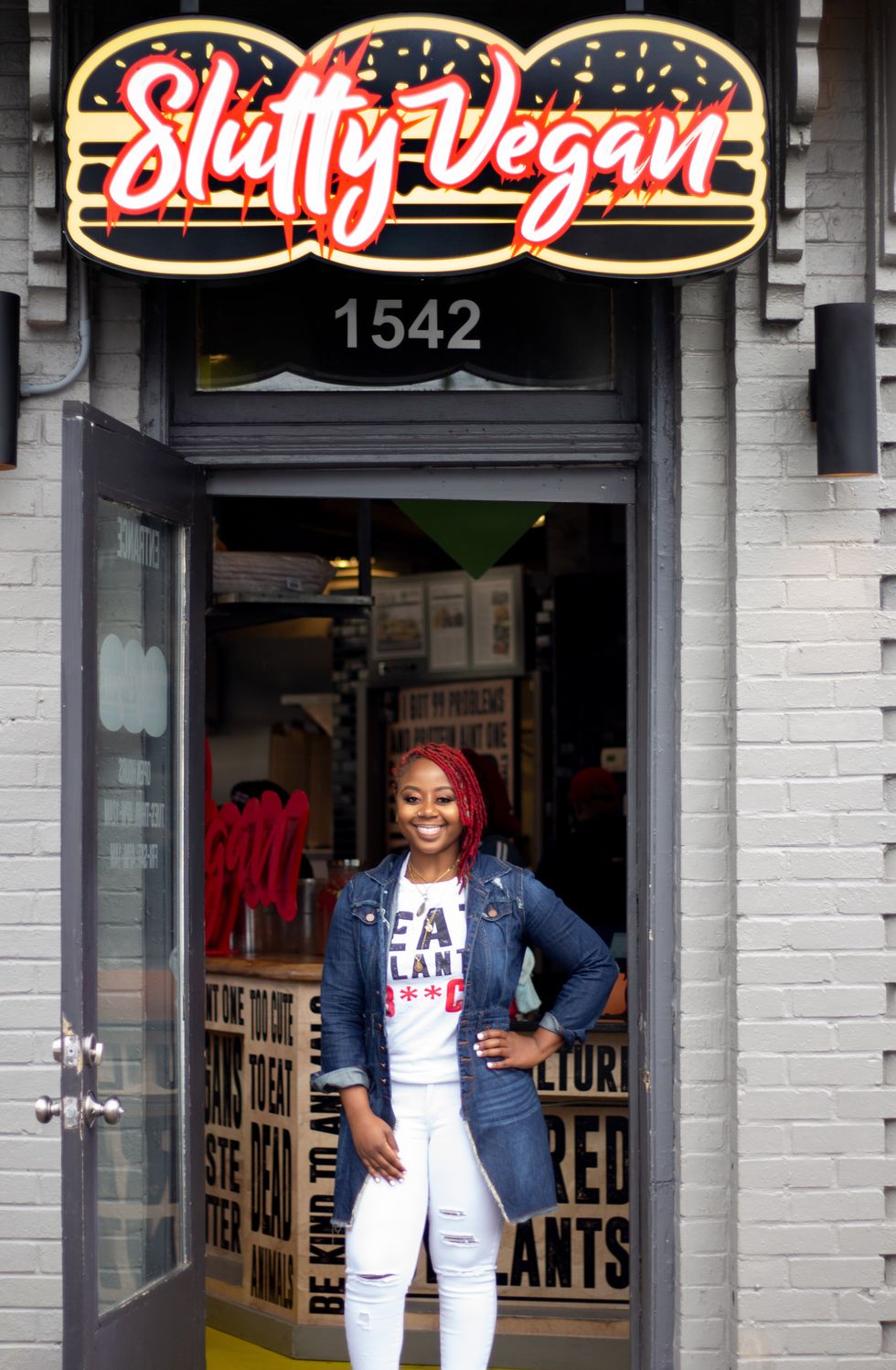
Photo by Tailiah Breon for xoNecole
"If [my first] restaurant didn't close, we wouldn't be having this conversation."
The future of Slutty Vegan seems promising. Pinky tells us that she has several projects in the works, including a development deal for a television show, possible Slutty Vegan airport locations, merchandise, franchising options, and ready-made bottles of her infamous Slutty Sauce for sale.
"If you have a great idea, a lot of faith and are steadfast on your goals, it doesn't take five years to [launch]. You can do what I did in six months and it can be super [successful]. It depends on how bad you want to win."
Like many founders, what's driving Pinky is the impact she has on everything she touches. "While the people are pouring into you, you have to pour back into the people. People will continue to support you if they see you are supporting the community."
Philanthropy and serving others are core values that she ensures surrounds the Slutty Vegan way. It's a mission that is the driving force behind why she looks forward to waking up each day. "This doesn't feel like work," Pinky says. "The refuel is knowing my doors are open every day, having conversations with people like you, to know that I'm responsible for feeding 25 mouths every week. I'm the captain of the ship, and if I fall asleep, the ship is going to sink and I'm not willing to let that happen. I built something that can take our community to the next level."
And we're certainly down to ride the wave.
To learn more about Slutty Vegan and how you can get #sluttified, visit https://sluttyveganatl.com and check out the brand on Instagram at @sluttyveganatl.
- Pinky Cole, Slutty Vegan ATL CEO joins Angie Ange in the Morning ... ›
- Pinky Cole @pinky907 Instagram Photos and Videos • Yooying ›
- This Slutty Ghost Restaurant Keeps Selling Out of Vegan Burgers ... ›
- Celebs are Flocking to New Plant-Based, Black-Owned Burger Joint ... ›
- Inside Her Story: Eat Healthier With 'The Slutty Vegan' | Black ... ›
- Slutty Vegan Starts a New Conversation Around Plant-Based Eating ... ›
- Slutty Vegan is enticing Atlanta foodies to rethink meat - Rolling Out ›
- Atlanta food truck The Slutty Vegan to open in Westview ›
- Slutty Vegan restaurant officially open for business - interview with ... ›
- How Pinky Cole used Instagram to make Slutty Vegan's burgers a ... ›
This Is How To Keep 'Holiday Season Stress' From Infecting Your Relationship
Hmph. Maybe it’s just me, but it seems like there is something really weird happening in the fall season air (because winter doesn’t officially begin until December 21) that cuddle season is in full swing while break-up season is as well. In fact, did you know that break-ups are so popular during the holiday season that December 11 is deemed Break-Up Day?
The reasons why relationships shift around this time vary; however, I did both roll my eyes and chuckle when I read that a very popular one is because it’s an easy way to get out of getting one’s significant other a Christmas present. SMDH.
Anyway, I personally think that the less shallow folks out here may contemplate calling things “quits” or they at least distance themselves a bit from their partner (and what I’m referring to is serious relationships) due to all of the stress and strain that oftentimes comes with the holidays whether it be financial, familial, due to their tight schedules or something else.
Listen, I would hate for you and your man to miss the fun and happiness of experiencing this time of year, all because you are so overwhelmed or irritated that you can’t really enjoy it. That’s why I have a few practical tips for how to avoid allowing the typical holiday season stress from INFECTING your relationship.
Manage Your Expectations
 Giphy
GiphyUnmanaged expectations. If there is a main reason why the holiday season tends to be so stress-filled for so many people, I’d bet good money that this is the cause. And when you’re in a long-term relationship, expectations can manifest themselves in all sorts of cryptic and/or unexpected ways. You might have relatives who assume that you are going to be with them for Thanksgiving or Christmas when you have other plans in mind. You might be thinking that you are going to spend one amount for presents while your man is thinking something totally different. When it comes to scheduling, your signals may be crossed.
And you know what? To all of these scenarios, this is where clear and consistent communication come in. Don’t assume anything. Don’t dictate anything either. From now until New Year’s, mutually decide to check in once a week, just to make sure that you are both on the same page as it relates to the holidays and what you both are thinking will come along with it. The less blindsided you both feel, the less stressed out you will be. Trust me on this.
Set (and Keep) a Budget
 Giphy
GiphyOkay, so I read that last year, 36 percent of Americans incurred some type of holiday-related debt. Hmph. Last year, there was still some sense of normalcy in this country, chile, so I can only imagine what finances are gonna look like over the next several weeks. That said, since I don’t know a lot of people who don’t find being broke stressful, make sure that you and your bae set a budget and then stick to it this year — no ifs, ands or buts.
Because really, y’all — it doesn’t make sense to deplete savings and/or max out credit cards for a few days of giggles only to be damn near losing your mind because you don’t know how to make ends meet come Dr. Martin Luther King, Jr. Day.
And by the way, this tip doesn’t just speak to things like food and gifts; I also mean travel. If it doesn’t make a ton of sense (or cents) to be all over the place this year — DON’T BE.
Keep Matthew 5:37 at the Forefront
 Giphy
GiphyIf off the top of your head, you don’t know what Matthew 5:37 says, no worries, here ya go: “But let your ‘Yes’ be ‘Yes,’ and your ‘No,’ ‘No.’ For whatever is more than these is from the evil one.” That verse right there? Oh, it’s a boundaries lifesaver! I say that because do you see “maybe” or “I’ll think about it” in there? Nope. LOL. It says that you should tell people “yes” or “no” and leave it at that — and that complements Anne Lamott’s quote, “’No’ is a complete sentence” impeccably well. Yeah, you’ve got to remember that anything beyond a yes or no to a request is privileged information; you don’t owe anyone details or an explanation.
Besides, if you are really honest with yourself, when someone asks you something and you give a “Umm, let me think about it” kind of reply, more times than not, you already know what your answer is going to be — so why not let you both off of the hook? Give your response. Commit to that. And let everyone (including yourself) get on with their lives and schedules.
I promise you that when it comes to those holiday parties, you are pissing more folks off by not RSVP’ing or doing so and not showing up than just saying, “Thank you but not this year” off the rip.
Remember That Your Personal Space Is Privilege Not a Right
 Giphy
GiphyA friend of mine recently bought a new house and invited me over to come see it. He’s a single man with no children, so as I was taking in all of the space that he had, especially as I walked through his finished basement, I joked about relatives coming to live with him. “Hell no” and “absolutely not” were pretty much his immediate responses as he went on to say that some folks even had the nerve to be offended when he told them that he had no intentions on taking DNA in.
Ain’t it wild how people think that your stuff is their right? And yes, that brings me to my next point. Your home is your sanctuary space. If you want to host folks this year — cool. If not, ALSO COOL. Please don’t let folks (family included) guilt you into how they want you to act or even into what they would do if the shoe was on the other foot. You are not them — and as one of my favorite quotes states, “If two people were exactly alike, one of them would be unnecessary.” (A man by the name Larry Dixon said that.)
Hell, my friends? They know that I am good for sending them random things that they need or even want all throughout the year. Coming over to hang out at my pace, though. Uh-uh. Chalk it up to being a card-carrying member of the ambivert club yet I like keeping my living space personal — and I sleep like a baby, each and every night, for feeling that way.
Always remember that your space, your time, your resources, your energy and shoot, yourself period (including your relationship), are all things that are your own. You get to choose how, when and why you want to share them. The holiday season is certainly no exception.
Cultivate Some “You Two Only” Traditions
 Giphy
GiphyIt’s not uncommon for some couples to hit me up after the holiday season to “detox.” Sometimes it’s due to the financial drama (and sometimes trauma) that they experienced. Sometimes it’s because they allowed their relatives (especially in-laws) to get more into their personal business than they should’ve. More than anything, though, it tends to be because they didn’t get enough quality time together and so ended up feeling “disconnected.”
Please don’t let that happen. Listen, I’m not even a holidays kind of woman and yet, I will absolutely sit myself down with some hot chocolate and chocolate chip cookies to enjoy a Hallmark holiday film or two. Aside from the fact that most of them are lighthearted and sweet, I also like that they usually focus on couples loving on each other amidst all of the holiday beauty and ambiance — which is something that all couples should set aside some time to do.
Maybe it’s a vacation. Maybe it’s a staycation. Or maybe it’s my personal favorite, A SEXCATION. Whether it’s for a few days, the weekend or even overnight — don’t you let the holidays go by without setting aside time for you and your man to celebrate one another. Don’t you dare (check out “Are You Ready To Have Some Very Merry 'Christmas Sex'?”).
GET. SOME. REST.
 Giphy
GiphyI once read that 8 out of 10 people get stressed out over the holidays and 3 out of 10 lose sleep during to it — and when you’re stress-filled and sleep-deprived, that can absolutely lead to hypersensitivity, making mountains out of molehills and even not being in the mood for sex.
Your relationship can’t afford to go through any of this, so definitely make sure to prioritize rest. I don’t care how unrealistic it might seem during this time, sleep should never be seen as a luxury; it will always and forever be a great necessity.
That said, try to get no less than six hours of shut-eye in (check out “6 Fascinating Ways Sex And Sleep Definitely Go Hand In Hand”) and even ask your bae to take a nap with you sometimes (check out “Wanna Have Some Next-Level Sex? Take A Nap, Sis.”). Not only will sleep help to restore your mind, body and spirit but, when it’s with your partner, it’s an act of intimacy that can make you both feel super connected, even in the midst of what might feel like chaos.
___
Holiday season stress is real. Still, never give it the permission or power to throw your relationship off. Put you and your man first and let the holidays be what they are gonna be, chile.
Let’s make things inbox official! Sign up for the xoNecole newsletter for love, wellness, career, and exclusive content delivered straight to your inbox.
Featured image by Shutterstock
It’s probably been over the past 2-3 years that I’ve become hyper-focused when it comes to applying certain chemical exfoliants known as acids to my skin. Personally, I’ve come to really appreciate ones like mandelic acid and hyaluronic acid because they have a way of softening my skin, brightening it up and really evening out my complexion overall.
In fact, on my skin, they have been so effective that they have caused me to wonder what would happen if I applied some of them to my hair too — and boy, was it an experiment that paid off big time!
If, while on your continual journey to get the best out of your own tresses, you’d like to learn how to get them healthier than it’s ever been, I’ve got seven acids that are typically known for skin use that can be just as beneficial to your hair as well.
1. Salicylic Acid
When it comes to your skin, salicylic acid is beta-hydroxy acid that is great for your skin if you’re looking for something that will exfoliate it, clear out your pores and dissolve dead skin cells. In fact, this is why it’s an acid that is quite popular when it comes to treating acne.
Your hair will enjoy salicylic acid because, if you’re looking to remove product build-up, you want to soothe an itchy or irritated scalp or you’ve got some dandruff flakes that are totally driving you up the wall, salicylic acid has the ability to treat all of this. Either purchasing a shampoo that contains this ingredient or adding it to your favorite scalp scrub is probably the most effective way to get the most out of it.
Just make sure that if your scalp is sensitive or dry that you approach with caution. In these instances, it could end up irritating your scalp more than helping it out, so use a very little bit in the beginning to make sure that it vibes with you.
2. Lactic Acid
Lactic acid is an alpha hydroxy acid that can help to even out your skin tone as well as slow down the signs of aging. The properties in it help to do this by reducing hyperpigmentation and boosting collagen production in your skin as well as keeping it hydrated.
Why is it great for your locks? For one thing, lactic acid is considered to be a humectant. This means that it pulls water from the air so that your hair is able to remain moisturized.
Another thing that makes it a winner is the fact that lactic acid breaks down dead skin cells on your scalp (so that your hair follicles are able to flourish), it can help to soften and detangle your hair (making it a helpful addition on your wash days) and it also helps to protect your tresses from heat styling tools and UV damage. Applying a hair rinse that’s made up of part lactic acid and part water can work wonderfully (so long as you apply it once a month, tops; more than that might be too “intense” for your hair strands).
3. Glycolic Acid
Glycolic acid is a water-soluble alpha hydroxy acid that is actually made from sugar. Your skin will adore it because it smooths the appearance of fine lines and wrinkles, improves the texture of your skin, gently exfoliates, clears your pores and brightens up your complexion overall.
The reasons why you should consider this acid for your hair is because it helps to keep your scalp youthful (and yes, there is such a thing; check out “Your Scalp Ages Six Times Faster Than Your Face. Why It Matters.”), removes excess sebum (that could be clogging up your hair follicles) and it helps to keep your hair moisturized. Your best bet here is to make it a part of your pre-shampooing ritual.
4. Succinic Acid
Succinic acid is an acid that is made from sugar cane and contains antimicrobial and anti-inflammatory properties. Although it doesn’t exactly exfoliate (like many of these other acids do), it can still be beneficial to your skin when it comes to reducing the kind of irritation that is associated with eczema, decreasing the bacteria that leads to breakouts and keeping your skin pretty hydrated.
As far as your hair goes, this is an acid that is worth trying out because it helps to balance the sebum that is on your scalp, remove dead skin and product build-up that can irritate your scalp and clog your hair follicles and, succinic acid is also beneficial when it comes to reducing dandruff and helping to prevent hair loss. Most people tend to apply this as a serum.
5. Hyaluronic Acid
I’ve officially sung the praises of hyaluronic acid on this platform before. One example is via the article, “Why Your Skin, Hair, And Nails Need Hyaluronic Acid Like...Yesterday.” On the skin tip, hyaluronic acid is great because it deeply hydrates your skin, contains anti-aging properties and can even bring relief to vaginal (including vulvar) dryness.
Your hair will adore this particular acid because it aids moisture to it (including your hair follicles), will help to improve your hair’s texture and it also soothes scalp dryness, nurtures the cuticles of your tresses and decreases frizz. Using a serum rich in this acid as a pre-poo or as a leave-in conditioner is recommended.
6. Azelaic Acid
If you’ve never heard of azelaic acid before, this is your lucky day. It’s a dicarboxylic acid that, when it comes to skincare (and hair care) products, is usually synthetic. Anyway, if you are looking for a way to reduce inflammation, even skin tone after a breakout or if you want to use an exfoliant that will improve the texture of your skin overtime, you might want to give this acid a shot.
This one makes the list as far as your hair is concerned because, if achieving more inches is your current focus, azelaic acid might come in handy. That’s because it is able to strengthen your hair, thicken your strands and also stimulate hair growth from within your hair follicles.
7. Glutamic Acid
Glutamic acid is actually a type of amino acid. Skin-wise, it’s great for deeply hydrating your skin as well as protecting it from pollutants and damaging UV rays. Also, if you’re looking for an acid that treats skin dryness or “tightness,” this could be the answer to your prayers.
Since glutamic acid is also considered to be a humectant, it’s another acid that can moisturize your hair. As a result, it can decrease breakage while helping your hair to feel smooth and look shiny.
BONUS: Amino Acids
Speaking of amino acids and hair, please try to keep some amino acids in your diet at all times. The reason why is because, since your hair is made up of mostly protein (keratin, to be exact), amino acids are pretty darn effective when it comes to helping you to maintain the overall health and well-being of your hair.
Ones to prioritize include proline (it boosts collagen so that your hair strands can maintain flexibility); arginine (it increases blood flow to your hair follicles so that they can receive the nutrients that they need); cysteine (it helps to keep your hair follicles healthy); alanine (it helps your system to produce more collagen), and isoleucine (it strengthens the tissues that help to make up your hair strands). All of these are available in supplement form or you can use Google to see which foods contain them.
___
Although it might initially seem odd to apply acid to your hair, as you can see, certain ones will work miracles for it. So, test them out to see which one tickles your fancy.
Hell, since they work for your skin as well — it’s a two-for-one deal that is worth every penny!
Let’s make things inbox official! Sign up for the xoNecole newsletter for love, wellness, career, and exclusive content delivered straight to your inbox.
Featured image by Shutterstock










